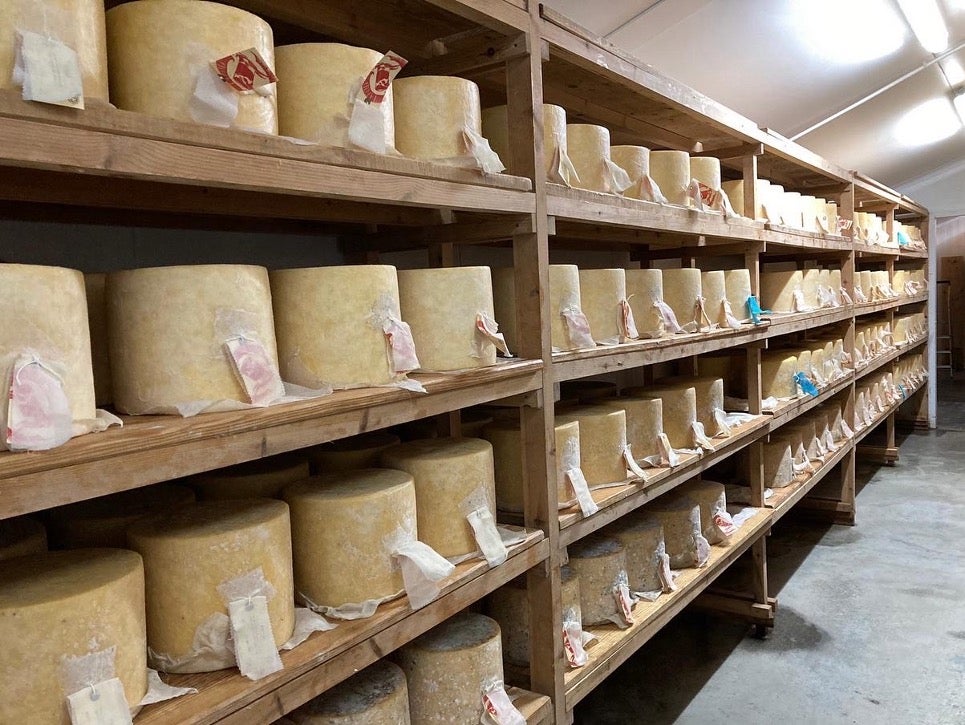The great cheese robbery – and why £300k worth of English cheddar might be destined for Russia
The shocking heist from Neal’s Yard Dairy has left the world of fromage in shock. But there’s still one question on everyone’s mind – how on earth are these criminals going to get rid of so much cheddar? Guy Walters investigates


Had the heist been £300,000 of gold or cash, the story would never have made headlines across the globe. But when the stolen valuable in question is cheddar cheese, people start to notice, and perhaps even find it funny. Of course, for Neal’s Yard, the dairy which reported the theft of some 22 tonnes of cheese last week, the crime is no laughing matter, but there is something undoubtedly jocular about what Jamie Oliver has referred to as the “great cheese robbery”.
What makes the heist all the more remarkable is that it was planned with the same meticulousness as something out of Ocean’s Eleven.
It all started back in July, when Neal’s Yard received an email supposedly from a well-known and reputable distributor from the European cheese industry, who, it was claimed, was supplying a popular French supermarket.
The con man – or men – spent the next few months building up what seemed like a trustworthy relationship with Sarah Stewart, the managing director and co-owner of Neal’s Yard, and by the end of September, the gang had collected and received 950 cheeses weighing some 22 tonnes.
Stewart soon suspected she had been swindled when she received no payment within an agreed week, and upon contacting the legitimate distributor, her worst fears were confirmed.
As might be expected, the heist has raised some big questions in the world of cheese – the most salient of which is this: how on earth are the criminals going to get rid of so much bloody cheese? They can’t eat all of it.
Offloading it would be straightforward if the crooks had got their mitts on some bog standard cheddar, but the cheeses in question are among the finest cheddars in the world. While in Italy, some £3m in parmesan is stolen every year, selling it is relatively easy because it is less distinctive than what was taken from Neal’s Yard.
“Hafod, westcombe and pitchfork are the Canalettos or the Stradivarius of the cheese world,” says John Farrand, managing director of The Guild of Fine Food, which organises the annual World Cheese Awards. “They are distinctive because the cheese is made by people who care about the raw ingredients, are bothered about the animals that give them the milk and make and mature their cheeses with diligence and attention. The end product is a work of art and distinctive because of it.”
Charlie Turnbull, a founding director of the Academy of Cheese, agrees. “These cheeses are made by those at the top of their game,” he says. “Any cheesemonger worth their salt will stock these cheeses. Even though these artisan cheddars are just 1 per cent of the industry, they are iconic.”

One of those who stocks them is Bill Dowling of Compton McRae, a gourmet delicatessen in Semley, Wiltshire, which even boasts a walk-in cheese room.
“People know each other extremely well in the cheese world,” says Dowling, “and while the makers are all of course competing with each other, it’s all done in a very friendly and open way. The English cheese market is really growing, and English cheese is getting more popular not just here, but overseas as well.”
It’s that closeness of the cheese world that will make it almost impossible for the thieves to sell their haul. Everyone will be on the lookout for these distinctive cheeses, and then there is the issue of food safety.
“You have to remember these products are made with raw milk, and what’s known as ‘the chill chain’ has to be bulletproof,” says Turnbull. “Nobody is going to risk buying a raw milk product off the back of a lorry.”
These cheeses are made by those at the top of their game. Any cheesemonger worth their salt will stock them
Then there is the question of how the cheeses are going to be stored by the criminals, as such fine cheddars demand constant attention, which is known in the trade as affinage.
They cannot simply be dumped in a lock-up, as they require humidity and turning. Also, the clock is ticking – cheese is, after all, a perishable foodstuff, and some of the cheeses that have been stolen have no more than a few months until they go bad.
“This is a product with a shelf life,” says Dowling. “It’s not like gold where you can sit and wait and gradually sell it off bit by bit. The criminals are going to have to move it quickly.”
Nevertheless, according to Stewart, the criminals seemed to know their way around the world of cheese, and it therefore seems unlikely that their choice of cheese was unwitting.
“It is possible that they have been stolen to order,” says Farrand. “If that is so, they’ll need to be moved to a market two or three times removed from here, such as Russia or the Middle East.”

However, as Turnbull says, getting the cheese across borders into Europe – even legitimately – is immensely difficult. “I’m sure there is the occasional trucker who will be willing to bend the rules,” he says, “or maybe it’s somehow been sent straight to Russia.”
While Russia is the hot favourite as the final destination for the cheese, both Farrand and Turnbull fear that the cheese may end up in landfill, or perhaps worse still, be re-processed and sold back in bulk to the food chain to be used in products like cheese straws. This would undoubtedly be a sorry fate for such fine foods.
Ultimately, the thieves might have made their life easier by stealing some more easily saleable high-end foodstuffs, like the thieves who made off with 2.7 million kilos of maple syrup – worth some £11m – from a warehouse in Quebec in 2012, or those who pinched 22 tonnes of red caviar from a lorry in Moscow in 2005.
Even lower-end foods are not exempt – more than £13,000 worth of Nutella was once stolen from a trailer in the German town of Bad Hersfeld in April 2011.
In the end, the theft from Neil's Yard could well become a serious case of hard cheese...





Join our commenting forum
Join thought-provoking conversations, follow other Independent readers and see their replies
Comments